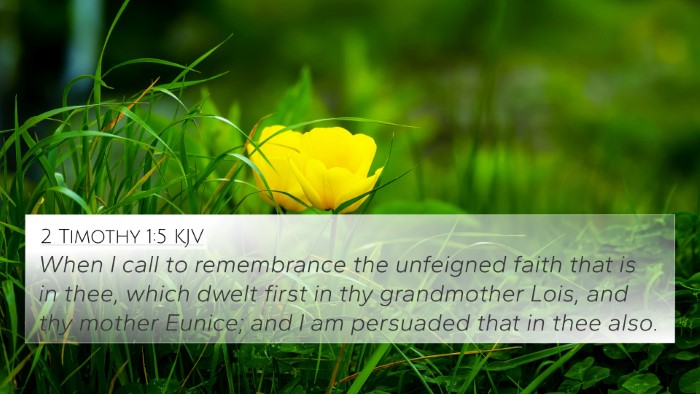Understanding 1 Timothy 5:10
Verse: 1 Timothy 5:10 states, "Well reported of for good works; if she have brought up children, if she have lodged strangers, if she have washed the saints' feet, if she have relieved the afflicted, if she have diligently followed every good work."
Summary of Meaning
This verse highlights the qualities and actions that characterize a godly woman in the context of church leadership and the care of widows. It establishes a standard for assessing the moral and ethical behavior of those who are recognized within the church, particularly regarding their deeds of service and compassion.
Insights from Commentaries
Commentators like Matthew Henry, Adam Clarke, and Albert Barnes provide deep insights into this verse, each contributing unique perspectives:
- Matthew Henry:
Henry emphasizes the importance of good works as evidence of true piety. He notes that the good deeds listed are practical demonstrations of a woman’s faith and character, particularly in nurturing children and offering hospitality.
- Adam Clarke:
Clarke elaborates on the social context of the early Church, remarking that these qualities were essential for the widows recognized in the community. He explains that “washed the saints' feet” symbolizes humility and service within the congregation.
- Albert Barnes:
Barnes points to the significance of these acts as foundational to the church's mission. He argues that such traits should inspire other members of the church community to engage in similar acts of kindness and service.
Thematic Connections
This verse interacts with several Biblical themes and cross-references:
- Acts of service and charity (Matthew 25:35-40)
- The role of women in the church (Titus 2:3-5)
- Hospitality (Hebrews 13:2)
- Compassion for the needy (James 1:27)
- Humility in service (John 13:14-15)
- Encouragement of the weary (Galatians 6:2)
- Good works as evidence of faith (Ephesians 2:10)
Cross-Referenced Themes
The actions listed in 1 Timothy 5:10 reflect a profound commitment to community and gracious living, echoing the message of the Gospel. They invite believers to engage in:
- Connecting with fellow believers through acts of love and service.
- Supporting the orphan and widow as emphasized in the Old Testament (Deuteronomy 10:18).
- Exemplifying the fruit of the Spirit (Galatians 5:22-23) in everyday life.
Application in Modern Church Life
In practicing these principles today, the verse teaches modern believers about the value of selflessness and community involvement. It encourages church members to seek out opportunities for service, to prioritize generosity, and to model the life of Christ.
Tools for Cross-Referencing
To dive deeper into linking Bible verses, consider using:
- Bible Concordance: To locate verses and themes quickly.
- Bible Cross-Reference Guide: For systematic study of related scriptures.
- Cross-Reference Bible Study: Engaging methods in group or personal study settings.
Conclusion
1 Timothy 5:10 provides not just a guideline for godly character in women of faith but also a flexible framework for understanding how individual actions contribute to the larger narrative of community within the faith. It encourages cross-referencing various verses across the Bible, enhancing our understanding of how scripture dialogues with itself. By engaging in service as exemplified in this verse, believers can continue the legacy of faith shown in both the New and Old Testaments.
Further Reflection Questions
- What can we learn from the life experiences of biblical women in relation to service?
- How can modern churches better support individuals demonstrating these qualities?
- In what ways can we deepen our commitment to community service?


























